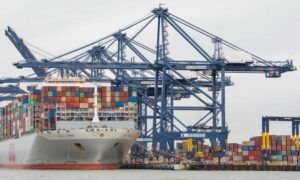
UK exports of clothing and footwear to the EU have dived since Brexit, according to a new study that shows the extent to which complex regulations and red tape at the border have deterred firms from sending goods across the Channel.
Exports of clothing and footwear sold to EU countries have fallen from £7.4bn in 2019 to £2.7bn in 2023, helping fuel an 18% slump in sales of all non-food goods exports to countries covered by the EU single market, according to the consultancy Retail Economics and online marketplace Tradebyte.
The report said the decline meant British brands and retailers have seen sales to the EU plummet since Brexit, despite a flourishing European e-commerce market.
The only sectors to increase export sales over the same period were health and beauty, and DIY and gardening, offsetting some of the fall from clothing and footwear.
Many of the worst affected were small and medium-sized businesses, which faced a larger relative burden from red tape than multinational firms.
One of the report’s authors, Richard Lim, head of Retail Economics, said some of the fall was simply down to a change in trade routes. UK firms that previously repackaged imports of goods made in Asia for sale in the EU have now reorganised their supply chains, by setting up offices inside the single market to bypass border regulations.
In one instance a sock-maker based in Leicester, which declined to be named, has shifted production to Italy, ending more than 100 years of manufacturing in the east Midlands, Lim said.
The UK has also failed to benefit from a boom in online goods sales in the EU since 2019, the authors suggest.
“Online retail is estimated to add £323bn of annual sales to EU economies, but additional trade frictions caused by Brexit-related complexities are curtailing this international sales opportunity for UK-based brands and retailers,” the reportstated.
Lim said: “It is a huge opportunity for UK brands that is not being grabbed.”
He said the fall in the value of trade with the EU was softened by last year’s spike in inflation, which increased the cost of goods for export.
